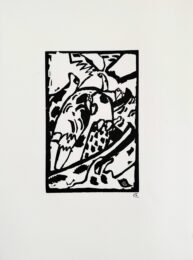

1866-1944
Russian painter and art theorist Wassily Kandinsky is credited as having painted one of the first recognised purely abstract pieces of art. He turned to abstract work after an extended period of development and intense thought based on his artistic experiences. He was totally devoted to an idea of inner beauty as a central focus of his art. Kandinsky was born in Moscow and grew up in Odessa, where he studied at Grekov Odessa Art school.
It was common for Kandinsky to use musical terms to describe his work. When he painted spontaneously he named them improvisations; the more elaborate and thought-through works he called compositions. Kandinsky was known not only as a painter but as a spiritual theorist. Many of his paintings were in fact painted with the purpose of evoking a spiritual resonance in viewer and artist. He wrote books explaining the relationship between spirituality and art and even prophesied future events, mainly focused around an apocalypse.
Later in life he played a part in establishing the Museum of the Culture of Painting. In 1920 Kandinsky moved to Germany and taught at the Bauhaus school of art and architecture until the Nazis closed the establishment in 1933. At this point Kandinsky moved to France. He lived there for the rest of his life, became a French citizen and produced some of his most famous work. Kandinsky is known as an art theorist as well as a painter.
Wassily Kandinsky produced many prints, his first prints being created in 1901. Many of Wassily Kandinsky’s prints are woodcuts prints though he also produced lithography prints and drypoint prints. All of Wassily Kandinsky prints are original prints as Kandinsky saw printmaking as a distinct medium to create artworks.